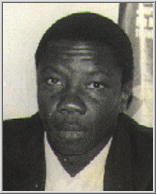FREEDOM NERUDA chose his name to symbolize his ideals. Born Teiti Roch D’Assomption in 1956 in the Ivory Coast, he became a teacher after graduation from the University of Abidjan. In 1988 he began his journalism career as a copy editor with the daily Ivoir’ Soir newspaper. Two years later he was an investigative reporter, first with Ivoir’ Soir, then with La Chronique du Soir, and next with La Voie, where he is currently chief editor.
As a journalist, he has lived up to his adopted name. Neruda has demonstrated unflinching commitment to the cause of press freedom despite President Henri Konan Bédié’s persistent efforts to silence the independent La Voie‘s critical coverage of the government’s policies and the actions of its officials. And La Voie, with a daily circulation of 25,000, has become the country’s best-selling independent newspaper since its founding in 1991.
Freedom Neruda’s ordeal began on Dec. 18, 1995, when La Voie ran his satirical article headlined “He Brought Bad Luck to ASEC,” which suggested that the presence of President Bédié at the African Champions Cup final against South Africa may have brought back luck to the Ivoirien soccer team, which lost the match. The article poked fun at Bédié’s election campaign poster, which had proclaimed that Bédié was good luck for the country. On Jan. 2, 1996, Neruda was arrested on charges of seditious libel. Two of his colleagues, publisher Abou Drahamane Sangaré and reporter Emmanuel Koré, had been arrested 12 days earlier. Each of the three journalists was sentenced to two years in prison for “offenses against the head of state,” and La Voie was fined and banned for three months. An appeals court later confirmed the sentences. President Bédié in a televised statement promised to pardon the La Voie journalists if they agreed to withdraw their appeal to the Supreme Court, but they immediately rejected that course of action as being tantamount to accepting the charges. The three were quietly released from prison on Jan. 1 of this year.
Unfortunately, this was not the first instance of harassment experienced by Neruda. He and his colleagues of the Nouvelle Horizons Publishing Group, the parent company, have previously been subjected to routine arrests, physical assaults, charges of “insulting the dignity of the head of state,” and levying of excessive fines. In October 1995 their editorial offices were destroyed by a fire bomb. Freedom Neruda’s experiences exemplify those of many of Africa’s dedicated independent journalists. He is a victim of one of the region’s most pernicious abuses: The use of seditious libel charges to silence the press in democratic states as well as those under single-party rule or military dictatorship.
| Links: |
Background
Côte D’Ivoire (Ivory Coast), January 2, 1996
Freedom Neruda, La Voie IMPRISONED
Neruda, deputy editor of the independent opposition daily La Voie, was taken into custody for questioning. Police had been searching for him since the December 1995 arrest of his colleagues Abou Drahamane Sangarè, the publications director of the Nouvel Horizon group, which owns La Voie, and Emmanuel Korè, a La Voie reporter. On Jan. 3, Neruda was charged with insulting the head of state in connection with a satirical article published in La Voie suggesting that President Henri Konan Bèdiè’s presence at the African Champions Cup final brought bad luck to the Ivorian soccer team, which lost to South Africa’s Orlando Pirates. On Jan. 11, Neruda was sentenced to two years in prison and fined CFA 6 million (US$12,000). CPJ wrote to President Bèdiè on two occasions: first, to protest Neruda’s arrest, and second, to condemn his sentencing and urge the president to revoke it along with the other two-year prison sentences handed down to Sangarè and Korè for “offending the chief of state.”
On June 12, an appeals court confirmed the sentences and Neruda and his colleagues filed an appeal with the Supreme Court. CPJ again wrote to Bèdiè and called for the reversal of the convictions and the immediate release of Neruda, Sangarè, and Korè. They were released on Jan. 1, 1997.
|CPJ home | Attacks Index | Awards 1997 |Report a Journalist in Trouble |